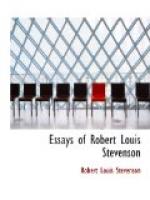[Note 16: All the world over, and every hour. He might truthfully have said, “every second.”]
[Note 17: A mere bag’s end, as the French say. A cul de sac.]
[Note 18: Our respected lexicographer ... Highland tour ... triple brass ... twenty-seven individual cups of tea. Dr. Samuel Johnson’s Dictionary appeared in 1755. For his horror of death, his fondness for tea, and his Highland tour with Boswell, see the latter’s Life of Johnson; consult the late Dr. Hill’s admirable index in his edition of the Life.]
[Note 19: Mim-mouthed friends. See J. Wright’s English Dialect Dictionary. “Mim-mouthed” means “affectedly prim or proper in speech.”]
[Note 20: “A peerage or Westminster Abbey!” Horatio Nelson (1758-1805), the most famous admiral in England’s naval history, who won the great battle of Trafalgar and lost his life in the moment of victory. Nelson was as ambitious as he was brave, and his cry that Stevenson quotes was characteristic.]
[Note 21: Tread down the nettle danger. Hotspur’s words in King Henry IV, Part I, Act II, Sc. 3. “Out of this nettle, danger, we pluck this flower, safety.”]
[Note 22: After Thackeray and Dickens had each fallen in mid-course? Thackeray and Dickens, dying in 1863 and in 1870 respectively, left unfinished Denis Duval and The Mystery of Edwin Drood. Stevenson himself left unfinished what would in all probability have been his unquestioned masterpiece, Weir of Hermiston.]
[Note 23: All who have meant good work with their whole hearts, have done good work. See Browning’s inspiring poem, Rabbi Ben Ezra, XXIII, XXIV, XXV:—
“Not on the vulgar mass
Called “work,”
must sentence pass,
Things done, which took the eye and had
the price;
O’er which, from level
stand,
The low world laid its hand,
Found straightway to its mind, could value
in a trice:
But all, the world’s
coarse thumb
And finger failed to plumb,
So passed in making up the main account;
All instincts immature,
All purposes unsure,
That weighed not as his work, yet swelled
the man’s amount:
Thoughts hardly to be packed
Into a narrow act,
Fancies that broke through language and
escaped;
All I could never be,
All, men ignored in me,
This, I was worth to God, whose wheel
the pitcher shaped.”]
[Note 24: Whom the Gods love die young. “Quem di diligunt adolescens moritur.”—Plautus, Bacchides, Act IV, Sc. 7.]
[Note 25: Trailing with him clouds of glory. This passage, from Wordsworth’s Ode on the Intimations of Immortality (1807), was a favorite one with Stevenson, and he quotes it several times in various essays.]




